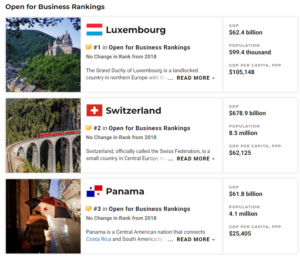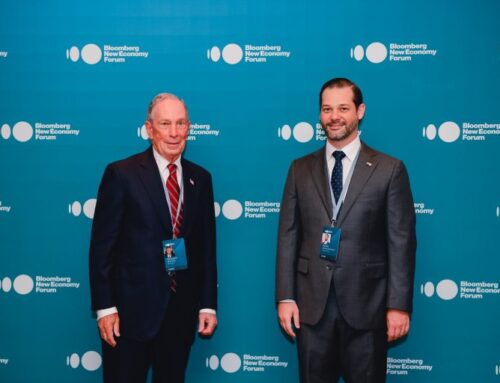In deciding where to bring their business, companies must define their priorities by weighing multiple operating and human costs. National governments face a similar cost-benefit analysis in setting corporate tax rates and policy. The countries considered the most business friendly are those that are perceived to best balance stability and expense.
The Best Countries rankings, formed in partnership with BAV Group, a unit of global marketing communications company VMLY&R, and the Wharton School of the University of Pennsylvania, are based on a survey that asked more than 20,000 people from four regions to associate 80 countries with specific characteristics. The Open for Business subranking is based on an equally weighted average of scores from five country attributes that relate to how open for business a country is: bureaucratic, cheap manufacturing costs, corrupt, favorable tax environment and transparent government practices. The Open for Business subranking score had a 11 percent weight in the overall Best Countries ranking.
Switzerland and Panama again finish at No. 2 and No. 3, respectively, mirroring the 2018 rankings. Panama finished in the bottom half of perceptions of transparent government practices. Western European nations dominate the top of the Open for Business rankings, with, Sweden and Denmark finishing fourth and fifth, respectively, but Singapore jumped seven spots to claim to the No. 6 slot. Canada, Norway, Finland and Thailand complete the top 10 countries in the ranking.
Nations prized for their openness pulled ahead in this subranking. Transparency International named Denmark the second least corrupt country in the world, and the country is ranked as the 12th-least corrupt country in the 2019 Best Countries report. Danes pay some of the highest rates of taxes, but view the expense as an investment in their quality of life.
Strong perceptions of corruption and bureaucracy in Russia and Iran make them seem like a risky places to do business. They ranked at the bottom of the rankings, along with Iraq, Saudi Arabia, Turkey and Belarus.
—
Ranking the Countries
The study and model used to score and rank countries were developed by BAV Group and The Wharton School of the University of Pennsylvania, specifically professor David J. Reibstein, in consultation with U.S. News & World Report.
A set of 65 country attributes – terms that can be used to describe a country and that are also relevant to the success of a modern nation – were identified. Attributes by nation were presented in a survey of more than 20,000 people from across the globe. Participants assessed how closely they associated an attribute with a nation.
Each country was scored on each of the 65 country attributes based on a collection of individual survey responses. The more a country was perceived to exemplify a certain characteristic in relation to the average, the higher that country’s attribute score and vice versa. These scores were normalized to account for outliers and transformed into a scale that could be compared across the board.
Attributes were grouped into nine subrankings that rolled into the Best Countries ranking: Adventure, Citizenship, Cultural Influence, Entrepreneurship, Heritage, Movers, Open for Business, Power and Quality of Life.
These thematic subrankings were formed by grouping country attributes that had similar global trends in survey responses. Subranking scores for each country were determined by averaging the scores that country received in each of the attributes comprising that subranking.
To determine the weight each subranking score had in the overall Best Countries score, each was correlated to 2017 gross domestic product at purchasing power parity per capita, a measure of inclusive prosperity, as reported by the International Monetary Fund. Subrankings that demonstrated a stronger relationship with the wealth metric were weighted more heavily, and all weights were standardized to total 100.
The Movers subranking represents a version of BAV’s BrandAsset Valuator Model of Brand Building, a metric developed by BAV that is predictive of a country’s future growth in terms of gross domestic product at purchasing power parity. Instead of one year of data, it was correlated to projected growth through 2022.
The subrankings, their weights in calculating the overall ranking score and the country attributes factored into each are below. The country attribute scores were equally weighted within each subranking. Subranking weights differ slightly from previous years, as they are tied to more recent gross domestic product data. They may not add up to precisely 100.00 due to rounding.
Adventure (2.00 percent): friendly, fun, pleasant climate, scenic, sexy
Citizenship (15.88 percent): cares about human rights, cares about the environment, gender equality, progressive, religious freedom, respects property rights, trustworthy, well-distributed political power
Cultural Influence (12.96 percent): culturally significant in terms of entertainment, fashionable, happy, has an influential culture, modern, prestigious, trendy
Entrepreneurship (17.87 percent): connected to the rest of the world, educated population, entrepreneurial, innovative, provides easy access to capital, skilled labor force, technological expertise, transparent business practices, well-developed infrastructure, well-developed legal framework
Heritage (1.13 percent): culturally accessible, has a rich history, has great food, many cultural attractions
Movers (14.36 percent): different, distinctive, dynamic, unique
Open for Business (11.08 percent): bureaucratic, cheap manufacturing costs, corrupt, favorable tax environment, transparent government practices
Power (7.95 percent): a leader, economically influential, politically influential, strong international alliances, strong military
Quality of Life (16.77 percent): a good job market, affordable, economically stable, family friendly, income equality, politically stable, safe, well-developed public education system, well-developed public health system
To arrive at a country’s rank, we first calculated its standardized scores for each of the 65 country attributes. Each country received nine subranking scores by averaging its scores for the country attributes grouped into that subranking. A country’s overall score reflects the weighted sum of its subranking scores. The subranking and overall scores were rescaled so that the top country in each category received a value of 100, and others were calculated as a proportion of that top score. Scores were ranked in descending order.






